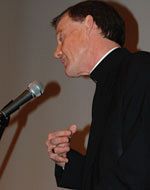Bishop Wester speaks of human rights, dignity for immigrants

SALT LAKE CITY — Just one week after an Immigration and Customs Enforcement (ICE) raid on Universal Industrial Sales, Inc., in Lindon, Westminster College’s "Beyond Borders and Fronteras" Forum brought together an interfaith panel to discuss immigration issues. Bishop John C. Wester of the Diocese of Salt Lake City and chairman of the United States Catholic Conference of Bishops’ (USCCB) Committee on Migration and Refugee Services, spoke, as did Pastor Steve Klemz of Zion Evangelical Lutheran Church and Elder Marlin K. Jensen of the First Quorum of the Seventy of the Church of Jesus Christ of Latter-day Saints. Acknowledging that immigration issues are complex, moderator Jan Saeed, spiritual life director at Westminster, asked each speaker to make a 15-minute statement, then opened the evening up to questions and answers. Bishop Wester, citing a number of papal and episcopal documents, said the American bishops have much to bring to the table on the subject of immigration. "The American bishops have echoed again and again the right of every person, regardless of their place of origin, to dignity and human rights," Bishop Wester said. "We are an immigrant church... and Catholics are involved in every facet of immigration, from the sending countries, the receiving countries, and the road along the way." Immigration, "is a human, moral, and ethical, issue that involves the human rights of millions," said the bishop. Present in the audience that evening were Johnny Young, executive director of migration and refugee services for the USCCB, Kevin Appleby, director of migration and refugee policy for the USCCB, and Yelda Cortez, executive assistant to Young, and herself an immigrant. The bishop said immigrations issues are best solved on the Federal level, but because they have not been handled on that level, states are hobbling together laws, and many of them are harsh. Still, the country sends immigrants a mixed message. "This country needs immigrant labor," Bishop Wester said, "especially in agriculture, the service industries, and construction, and immigrants pay into our tax system, putting $700,000 into the social security system, the benefits from which they will never see... But we also put a ‘No Trespassing’ sign up at the border and a ‘Help Wanted’ sign at the workplace." The bishop said there are about 12 million people currently in this country illegally, many of whom came into the country legally, but have let their visas lapsed, "but more than 90 percent of them found work within the first six months of being here. Yet, the U.S. issues only 5,000 workers’ visas a year. So the system is inadequate. It is broken." In addition, he said, some 3,000 have died in the desert over the years, trying get here. The bishop said the U.S. should be crafting policies that address why people migrate, and we should restore due process to the immigration system. "We should not be separating families to enforce these laws, but should be working toward the reunification of families," he said. "The church acknowledges the rule of law," he said, "but it recognizes that not all laws are equal. We have had laws in our history that have persecuted people in the past." Any study of immigration should include consideration of the intent and the consequences of immigration, he added. "The intent of most immigrants is not to do harm, but to survive," Bishop Wester said. "The consequences of their coming is that they benefit the country and enrich our society." The American bishops are proposing immigration policy that provides a path to citizenship that includes fines and fees for those who have been in the country illegally, learning English, and waiting until those entering the country have been accommodated for. "We are not talking amnesty, which is forgiveness; a general pardon," Bishop Wester said. "We are proposing an earned path to citizenship." Pastor Klemz, who is going through the documentation process with his wife, thanked the Catholic Church for being front and center on the immigration issue. "If you have never been through immigration court, there’s no way to understanding it," he said. "And if you have been there, there’s no way to explain it. "Bishop Wester is like a voice of fresh air on this issue," said Pastor Klemz, who, like Bishop Wester, draws from the Hebrew Scriptures for words on hospitality and welcoming the stranger. "Hospitality is a sign of the presence of God," he said. "And we must move from the head to the heart when families are concerned." Pastor Klemz said over the years, the Lutheran Immigration and Relief Services have resettled 11,500 children through a network that serves and resettles. He read from the 1998 Evangelical Lutheran Message on Immigration, which, he said, was grounded in grace, and a gift that springs from the sacraments. "Like the loaves and fishes," he said, "people should be received as gifts." Lutherans identify with the immigrant and the migrant, Pastor Klemz said, because after World War II, many Lutherans were either refugees or migrants. "We need to get rid of the posture of fear and welcome one another because we are all God’s creatures," he said. Elder Jensen said the Church of Jesus Christ of Latter-day Saints owes a debt to immigrants. "Our church sent missionaries abroad to invite people to join the church, and many came to this country." Citing the 32 million Americans who are foreign born and the 12 million of them who are undocumented, Elder Jensen said, "It’s time we made up our minds and developed a truly cohesive policy." The LDS Church has taken no position on immigration, but senior leaders have called for humanity and compassion.
© Copyright 2025 The Diocese of Salt Lake City. All rights reserved.

Stay Connected With Us